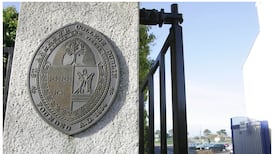THE BRITISH Prime Minister Mr John Major, last night pinned his hopes on a resurgent "feel good" factor recasting the economy at the heart of Britain's protracted election campaign.
At the same time, Mr Major signalled fresh battles with Europe in anticipation of a ruling against Britain later this morning on the 48 hour maximum working week. The Prime Minister said: "If the Court rules against us, we will require changes in European law to reinforce Britain's protection from such legislation. Our partners know that. And they know we shall insist upon these changes before we can conclude any new agreements at the Inter Governmental Conference next year.
Tory MPs welcomed the prime minister's attempt to turn the spotlight off a `morality' debate which has benefited Labour and over shadowed the government's legislative programme for the final parliamentary session.
Offering "three cheers" for Mr Major's return to the economic battlefield, former minister Mr David Mellor welcomed the end of "an unhealthy couple of weeks when the party leaders seemed to be vying to be the next Archbishop of Canterbury".
Promising a "prudent and sensible budget" to safeguard his government's economic advances, Mr Major claimed Britain had the economic strength to become one of the great global trading nations of the next century.
In his annual speech to the Lord Mayor's Banquet at London's Guildhall, he said the "last crucial ingredient for future success" was national self confidence.
Since his first Guildhall speech six years ago, Mr Major said, the country had passed through a turbulent recession and emerged in vigorous economic health. Previous recoveries had been derailed by yawning trade gaps or soaring inflation. "But not this time," he declared: "All the evidence is that we have moved from a country prone to erratic bouts of high inflation to one where subdued inflation can be the norm."
Proclaiming this "a change of historic importance", Mr Major cited massive inward investment, the reining back of public expenditure, the lowest basic tax rate for 50 years, strikes at one 25th of the 1979 figures and the privatisation of huge swathes of industry as key elements in the recovery.
Earlier yesterday, Mr Major rejected the idea that Britain was "facing the collapse of ordinary decent values". And in a swipe at Labour, he said "hard edged policies" were needed to deal with crime, schools and the problems of the poorest.
. Millions of people in shops, offices and factories throughout Britain observed a two minute silence to honour the country's war dead yesterday in the first such weekday tribute since the 1930s. The tribute came at 11 o'clock on the 11th day of the 11th month - the time of the 1918 armistice that ended the first World War.







